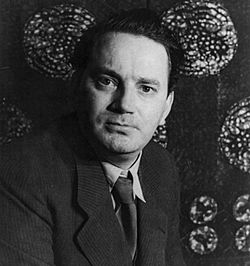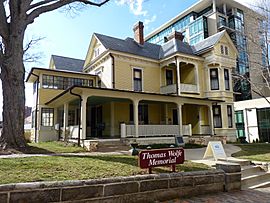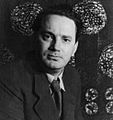Thomas Wolfe facts for kids
Quick facts for kids
Thomas Wolfe
|
|
|---|---|

1937 portrait by Carl Van Vechten
|
|
| Born | Thomas Clayton Wolfe October 3, 1900 Asheville, North Carolina, U.S. |
| Died | September 15, 1938 (aged 37) Baltimore, Maryland, U.S. |
| Resting place | Riverside Cemetery Asheville, NC |
| Occupation | Author |
| Alma mater | |
| Genre | Fiction, drama |
| Notable works |
|
| Signature | |
 |
|
Thomas Clayton Wolfe (born October 3, 1900 – died September 15, 1938) was an American novelist from the early 1900s. He wrote many long novels, short stories, and plays.
Wolfe was known for his unique writing style. He mixed poetic and descriptive language with stories from his own life. His books were published from the 1920s to the 1940s. They showed a clear picture of American culture during that time.
Many famous writers were influenced by Thomas Wolfe. These include William Faulkner, Jack Kerouac, Ray Bradbury, and Philip Roth. He is still seen as an important writer in modern American literature. He was one of the first to master writing novels based on his own life. Many consider him North Carolina's most famous writer.
Contents
Early Life and Education
Thomas Wolfe was born in Asheville, North Carolina. He was the youngest of eight children. His father, William Oliver Wolfe, carved gravestones. His mother, Julia Elizabeth Westall, bought and sold real estate. She also ran a boarding house.
The family used an angel statue to attract customers to his father's business. Thomas Wolfe wrote about this angel in detail in his famous novel, Look Homeward, Angel.
In 1904, Wolfe's family went to the World's Fair in St. Louis, Missouri. Sadly, his 12-year-old brother, Grover, died there from typhoid fever.

In 1906, his mother bought a boarding house called "Old Kentucky Home." It was at 48 Spruce Street in Asheville. Thomas lived there until he went to college in 1916. This house is now the Thomas Wolfe Memorial. Thomas was very close to his brother Ben. Ben's early death at age 26 is a big part of Look Homeward, Angel.
Wolfe started college at the University of North Carolina at Chapel Hill (UNC) when he was 15. He wanted to be a playwright. In 1919, his play The Return of Buck Gavin was performed by the Carolina Playmakers. Wolfe even acted in the play! He also worked on UNC's student newspaper, The Daily Tar Heel.
After graduating from UNC in 1920, Wolfe went to Harvard University. He studied playwriting there. In 1922, he earned his master's degree. His father passed away that same year. Wolfe continued to write plays. In 1924, he started teaching English at New York University (NYU). He taught there for almost seven years.
Writing Career
Wolfe found it hard to get his plays produced because they were very long. He realized his writing style was better suited for novels. In 1924, he sailed to Europe to keep writing.
In 1925, he met Aline Bernstein. She was a scene designer for the Theatre Guild. She encouraged his writing and helped him financially.
In 1926, Wolfe began writing his first novel, O Lost. This book later became Look Homeward, Angel. It was based on his early life in Asheville. He changed the town's name to Altamont. His family became the Gant family, and he called himself Eugene.
The original manuscript of O Lost was very long. It was over 1,100 pages. Maxwell Perkins, a famous editor at Scribner's, helped him edit the book. Perkins also worked with writers like Ernest Hemingway and F. Scott Fitzgerald. He cut the book to focus on the character of Eugene.
Look Homeward, Angel was published in 1929. It caused a stir in Asheville because many local people recognized themselves in the characters. Wolfe stayed away from Asheville for eight years because of the reaction. The book became a bestseller in the United Kingdom and Germany.
After four more years of writing, Wolfe submitted his second novel. It was called The October Fair. Perkins again cut it down significantly. It was published as Of Time and the River. This book was even more successful than Look Homeward, Angel.
Later, Wolfe decided to leave Scribner's and work with Harper & Brothers. Some say he left because he felt Perkins edited his work too much. Others say he was tired of people saying Perkins was responsible for his success.
Wolfe spent a lot of time in Europe. He was especially popular in Germany. However, in 1936, he saw how Jewish people were being treated unfairly. This upset him greatly. He wrote a story about his observations called "I Have a Thing to Tell You." After this story was published, the German government banned his books. He was also not allowed to travel to Germany anymore.
Later Life and Death
In 1938, Wolfe finished a huge manuscript for his new editor, Edward Aswell. He then went on a trip to the Western United States. He visited 11 national parks. This was the only part of the country he had never seen.
While in Seattle, he became sick with pneumonia. He spent three weeks in the hospital. Later, doctors found he had a severe form of miliary tuberculosis. This disease had spread to his brain.
On September 6, he was moved to Johns Hopkins Hospital in Baltimore. Doctors tried to help him, but the disease had taken over the right side of his brain. Thomas Wolfe died on September 15, 1938. He was just 37 years old.
Before he died, Wolfe wrote a letter to Maxwell Perkins. He thanked Perkins for helping him achieve his writing goals. Wolfe was buried in Riverside Cemetery in Asheville, North Carolina. He was buried next to his parents and siblings.
Books Published After His Death
Thomas Wolfe had written a lot of material that was not published when he was alive. He was the first American writer to leave two complete, unpublished novels when he died.
His editor, Edward Aswell, helped publish these novels: The Web and the Rock (1939) and You Can't Go Home Again (1940). These books were very long, almost 700 pages each. In these novels, Wolfe changed his main character's name from Eugene Gant to George Webber.
In 2000, the original version of Look Homeward, Angel, called O Lost, was finally published. A scholar named Matthew Bruccoli put it back together. He believed that O Lost was a masterpiece and better than the edited version.
Thomas Wolfe's Impact
Thomas Wolfe inspired many other authors. These include Betty Smith, who wrote A Tree Grows in Brooklyn, and Pat Conroy, who wrote Prince of Tides. Conroy said his writing career started the moment he finished Look Homeward, Angel. Jack Kerouac greatly admired Wolfe. Ray Bradbury was also influenced by him and even included Wolfe as a character in his books.
The Thomas Wolfe Society was created in the late 1970s. It celebrates Wolfe's writings and publishes a yearly review about his work. The United States Postal Service even honored Wolfe with a postage stamp in 2000, on what would have been his 100th birthday.
Historic Places
The "Old Kentucky Home" boarding house, where Wolfe grew up, is now the Thomas Wolfe Memorial. It has been open to visitors since the 1950s. Wolfe called it "Dixieland" in his novel. In 1998, a fire damaged the house, but it was restored and reopened in 2003.
A cabin where Wolfe stayed in 1937 was also made a historic landmark. It's called the Thomas Wolfe Cabin. He wrote about his plans for future books while there.
Books by Thomas Wolfe
Novels
- Look Homeward, Angel (1929)
- Of Time and the River (1935)
- The Web and the Rock (1939; published after his death)
- You Can't Go Home Again (1940; published after his death)
- The Hills Beyond (1941; published after his death)
Plays
- Welcome to Our City: A Play in Ten Scenes (Performed in 1923; published after his death in 1983)
Short Stories and Collections
- From Death to Morning (1935; a collection of stories)
- "I Have a Thing to Tell You" (1937)
- The Lost Boy (1937)
- "Chickamauga" (1937)
Nonfiction
- The Story of a Novel (1936)
Adaptations of His Work
In 1958, Ketti Frings turned Look Homeward, Angel into a successful play. It won the 1958 Pulitzer Prize for Drama.
Wolfe's relationship with his editor Maxwell Perkins was the basis for the 2016 movie Genius. In the film, Jude Law played Thomas Wolfe, and Colin Firth played Maxwell Perkins.
Images for kids
See also
 In Spanish: Thomas Wolfe para niños
In Spanish: Thomas Wolfe para niños
 | Frances Mary Albrier |
 | Whitney Young |
 | Muhammad Ali |


